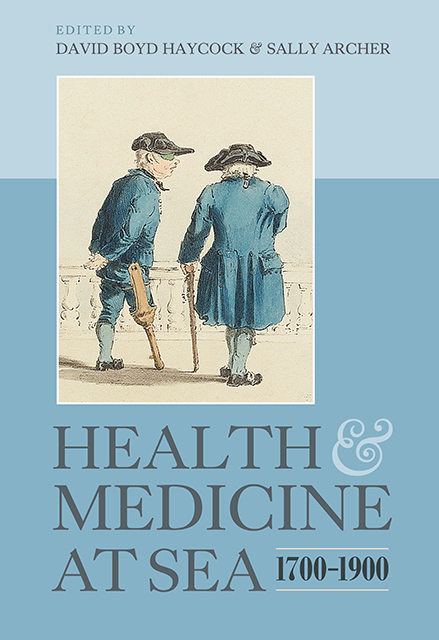Book contents
- Frontmatter
- Contents
- List of Figures and Tables
- Preface
- List of Contributors
- Acknowledgements
- List of Abbreviations
- Introduction Health, Medicine and the Maritime World: A History of Two Centuries
- 1 ‘The Intention is Certain Noble’: The Western Squadron, Medical Trials, and the Sick and Hurt Board during the Seven Years War (1756–63)
- 2 Royal Navy Surgeons, 1793–1815: A Collective Biography
- 3 Surgery in the Royal Navy during the Republican and Napoleonic Wars (1793–1815)
- 4 The Sick and Hurt Board: Fit for Purpose?
- 5 An ‘Important and Truly National Subject’: The West Africa Service and the Health of the Royal Navy in the Mid Nineteenth Century
- 6 Mortality and Migration: A Survey 128
- 7 Slave Purchasing Strategies and Shipboard Mortality: Day-to-Day Evidence from the Dutch African Trade, 1751–1797
- 8 Ships, Families and Surgeons: Migrant Voyages to Australia in the Age of Sail
- 9 Medical Encounters on the Kala Pani: Regulation and Resistance in the Passages of Indentured Indian Migrants, 1834–1900
- Bibliography
- Index
9 - Medical Encounters on the Kala Pani: Regulation and Resistance in the Passages of Indentured Indian Migrants, 1834–1900
Published online by Cambridge University Press: 07 March 2023
- Frontmatter
- Contents
- List of Figures and Tables
- Preface
- List of Contributors
- Acknowledgements
- List of Abbreviations
- Introduction Health, Medicine and the Maritime World: A History of Two Centuries
- 1 ‘The Intention is Certain Noble’: The Western Squadron, Medical Trials, and the Sick and Hurt Board during the Seven Years War (1756–63)
- 2 Royal Navy Surgeons, 1793–1815: A Collective Biography
- 3 Surgery in the Royal Navy during the Republican and Napoleonic Wars (1793–1815)
- 4 The Sick and Hurt Board: Fit for Purpose?
- 5 An ‘Important and Truly National Subject’: The West Africa Service and the Health of the Royal Navy in the Mid Nineteenth Century
- 6 Mortality and Migration: A Survey 128
- 7 Slave Purchasing Strategies and Shipboard Mortality: Day-to-Day Evidence from the Dutch African Trade, 1751–1797
- 8 Ships, Families and Surgeons: Migrant Voyages to Australia in the Age of Sail
- 9 Medical Encounters on the Kala Pani: Regulation and Resistance in the Passages of Indentured Indian Migrants, 1834–1900
- Bibliography
- Index
Summary
During the nineteenth century, over one million migrants left the Indian sub-continent to cross the Kala Pani (‘dark waters’) as indentured workers for the tropical colonies of the Atlantic, Pacific and Indian Oceans. For many of these migrants, the voyage marked a profound rupture with the social and cultural worlds which defined their lives in India. Emigration across the Kala Pani was seen as breaking Hindu prohibitions, resulting in the migrant's loss of caste. In early 1898, as he was just about to board the ship Avon heading to Dutch Surinam, Munshi Rahman Khan observed how caste, class and religious divisions had already begun to break down in the depot in which migrants were gathered before embarkation from Calcutta. Rahman Khan described how an earthen pot,
was used to keep water for multifarious activities like drinking, washing hands and face, and washing after defecation, etc. This was highly unhygienic and especially against the habits of the Sanatans [orthodox Hindus] who had earlier followed their beliefs rigidly.
As Rahman Khan's fellow passengers removed the ceremonial threads and jewellery that marked their social status in India, they faced the uncertainties of a maritime passage that was often an exceedingly harsh physical experience dominated by the dangers of the ocean, disease and violence at the hands of the ships’ crews.
It was these threats of coercion and death that led many British and colonial abolitionists to label Asian indentureship as a ‘new system of slavery’ in the 1830s and 1840s. The fluctuating mortality of Indians on the Kala Pani, and upon arrival, stirred repeated debates over the legitimacy of indentureship and resulted in its temporary suspension in 1839 and 1856. Facing the spectre of the horrific maritime mortality that had afflicted the Middle Passage of the trans-Atlantic slave trade, British imperial authorities defended Asian indenture by emphasizing their close medical management of the oceanic passage from India. The debates over maritime mortality during the nineteenth century have remained a central focus for historians exploring indentured migration from South Asia, as they raise fundamental issues over the nature of indentureship, including the extent to which it was a coercive or voluntary form of migration, and the role of the colonial state in its regulation and expansion.
- Type
- Chapter
- Information
- Health and Medicine at Sea, 1700-1900 , pp. 195 - 212Publisher: Boydell & BrewerPrint publication year: 2009



